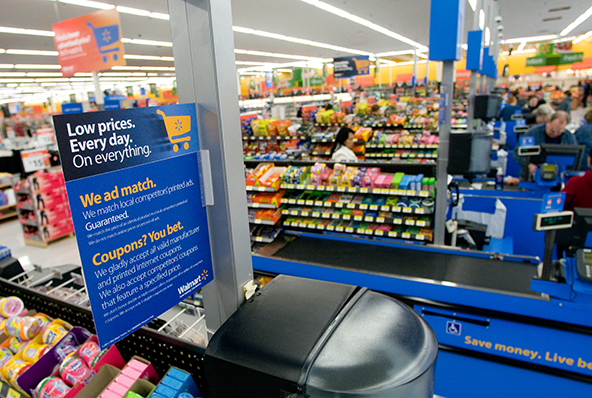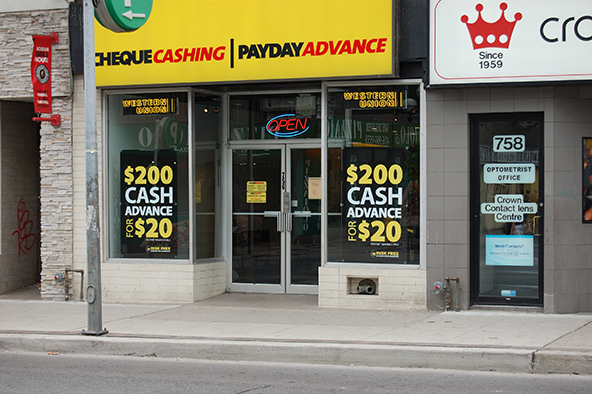Wal-Mart’s Merchant Customer Exchange vs. Google Wallet: Who Will You Bet On?

Reuters tells us that Wal-Mart’s newly-announced mobile wallet project is winning the endorsements of a growing number of large merchants, precisely the type of retailers Google is hoping to attract for its own digital wallet service. Merchant Customer Exchange (MCX), as Wal-Mart’s m-wallet initiative is called (can someone please help the merchants come up with something less clunky for a name?) is not even two months old, but the rate at which it attracts participants should be worrying the search giant’s executives. After all, how likely is it that, once their own wallet is fully functional and ready to be deployed, the retail giants will be willing to let competing services into their stores?
Google Wallet had had problems gaining traction even before MCX entered the industry. In fact, the search giant’s m-wallet has been live for more than a year, but is yet to sign up a single big-box merchant. To make matters worse, anecdotal evidence suggests that smaller retailers that have signed up for the service are not really excited about it. One of them told us last week that in the eight months since they installed a point-of-sale device compatible with Google Wallet, no one has tried it. So things are not looking great for Google Wallet, and that may end up being an understatement.
21 Big Retailers Have Signed up for Wal-Mart’s Mobile Wallet
When MCX was announced in mid-August, the collaborative project featured 14 merchants, including Best Buy, Lowe’s, CVS, Shell, Sears, Target, 7-Eleven and Sunoco, in addition to Wal-Mart itself. Now that number has grown to 21 and the new additions include Gap, Bed Bath & Beyond, Dunkin’ Brands Group Inc., Dillards Inc. and convenience store operator Sheetz Inc., Reuters tells us.
There is no reason to expect that MCX will suddenly stop growing; on the contrary, its roster is likely to keep expanding. And mass is critical for MCX’s success, as Reuters reminds us:
The founders of MCX hope the burgeoning membership, including some big-name retailers, could give mobile payment the critical mass it needs to take off.
It seems to me that MCX already has reached critical mass and it needs to begin rolling out its service.
So what about Google?
Google Wallet was never able to gain any momentum, even though it had the market all for itself for a year before MCX was announced. And for a good reason: even today there are very few merchants, which have installed POS devices that are compatible with near-field communication (NFC) — the technology behind Google’s (and MCX’s, as far as we know) wallets. Moreover, there are only a handful of NFC-enabled smart phones and, famously, iPhone 5 is not one of them.
That lack of infrastructure has been, I think, the biggest obstacle to Google Wallet’s progress and the reason the search giant has been unable to capitalize on the hugely bungled attempt of three of the largest U.S. mobile carriers to create a competing service. You may remember that when Isis, as that project is called, was first announced, it was supposed to become a fully-fledged payment network, to rival Visa and MasterCard. It took some time, but the carriers eventually did realize that what they were getting themselves into was somewhat more complicated than they thought and scaled back their ambitions, blaming regulation for their misfortune and opening up their wallet to all card networks in the process. And yet, two years after it was announced, Isis still exists only in the minds of its promoters. As I’ve said before, during that time, “Isis has managed to get a number of announcements broadcast by the media, even as most of them have been distinctly news-unworthy or just plain embarrassing“.
And yet, Google, which has largely been spared of such embarrassments (with the exception of the quickly-fixed PIN security flaw), has been unable to benefit from its main competitor’s mishaps.
The Takeaway
So I think that at this point it’s fair to say that Google Wallet is in trouble. I expect that, whenever MCX goes live, the participating merchants will do everything they can to block Google’s wallet (and Isis, for that matter, if it ever goes live) from their checkout lanes, just as Verizon did with its customer accounts. And if Google can’t get into the big retail chains, I doubt that it could ever reach the critical mass it needs to become viable. It is conceivable that in our hypothetical scenario the search giant would take legal actions to force the merchants to open up, but it’s unclear how such a lawsuit would turn out and, in any case, it would be a protracted affair, by the end of which the merchants may have won the war. So there is a very good probability that Google Wallet will share the unhappy fate of the service it replaced — Google Checkout. And, for Wal-Mart at least, such an outcome would not come as a shock.
Image credit: Walmart.com.


